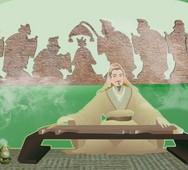The Duke of Zhou was a younger brother of King Wu. In Chinese history, he was known as an exemplar of filial piety (respect for one’s parents and ancestors) and benevolence.
These virtues were evident from an early age. As talented as his brothers in childhood, the Duke of Zhou distinguished himself from them through his discipline in practising filial piety and benevolence.
As an adult, he helped his brother, King Wu, go eastward with their chariot troops to conquer the Shang Dynasty. At this point the ruler of the Shang was extremely unpopular due to his belligerent nature and a lavish lifestyle lived at the expense of his people.
 |
| Duke of Zhou, who created the benevolent Zhou rites, was considered an exemplary figure for more than 2000 years. (Illustrated by Catherine Chang, Epoch Times Staff) |
With the considerable assistance of the Duke of Zhou, King Wu defeated the Shang and their notorious ruler, who ended up committing suicide. To comfort the supporters and nobles of the Shang Dynasty, King Wu adopted the generous and benevolent policy recommended by the Duke of Zhou, namely “keeping individuals in their stations rather than killing them.”
They released Shang residents and nobles who were detained and opened up granaries to relieve the hungry. Meanwhile, influential but righteous nobles and the social elite were encouraged to help set up a subservient state with the son of the last ruler of the Shang.
The Duke of Zhou believed that heaven would delegate the divine right of ruling to the people who are morally worthy, also known as the “mandate of heaven”. In contrast to the previous Shang ruler who created many harsh laws under his reign, which caused wide unrest, the Duke of Zhou fashioned a series of humane policies to promote virtue and consolidate the newly established dynasty.
He introduced rites and music. He also endeavoured to“use virtue to enlighten people and use punishment with prudence” and “honour virtue and care for the people”. These policies were highly praised and followed by rulers of later generations.
The way the Duke of Zhou treated and recruited talented people was regarded as a model by later officials. The Duke of Zhou would stop anything he was doing in order to meet with a sage. For instance, he might stop washing his hair or eating a meal so he could meet immediately with talented people who had come to express their proposals for how to rule the nation.
After King Wu died, the son and crown prince, King Cheng, succeeded to the throne of the Zhou Dynasty. Since King Cheng was too young, the Duke Zhou acted as regent for over six years and never sought to seize the throne for his own.
During the Duke’s regency he instructed the young King Cheng on how to govern the nation with virtue and advised him not to indulge in sensual desires, comfort, playing, and hunting. When King Cheng was old enough to rule, the Duke Zhou voluntarily relinquished the power to King Cheng with a consolidated territory
In his later years, the Duke of Zhou carried on working hard on the introduction of rites and music and continued to improve various institutions and regulations. He developed a series of comprehensive Zhou rites, in which he set up detailed requirements for customs and laws that ranged from national policy to individual’s everyday behaviour.
The Zhou rites contained a number of legal institutions such as a patriarchal system (to maintain the rule of the hereditary nobility, including that the eldest son of the consort would inherit the throne and other sons from the consort, concubines, and mistresses would be given titles), a feudal system (to nominate and divide land among the royal family members), and ritual system (ceremonies and procedures used for the important national affairs).
The rites also included such matters of daily life as weddings and funerals, rites of passage, sacrifices, and so on.
Later, Confucian scholars compiled a special book of the Zhou rites. For approximately two thousand years, the central virtues of the Zhou rites—benevolence, righteousness, propriety, wisdom, and trust—were the norms of moral behaviour for the Chinese people.
The Zhou rites introduced by the Duke of Zhou have been passed down from generation to generation and have been regarded as a treasure of Chinese culture. The rites defining marriage still maintain considerable influence on Chinese people today.
The Zhou Dynasty (BC 1122 to BC 221) was the longest dynasty in Chinese history and lasted 900 years before it was succeeded by the Qin Dynasty according to traditional Chinese historians.
Chinese historians divide the Zhou Dynasty into two periods at BC 770, namely the Western Zhou from BC 1122 to BC 770 and the Eastern Zhou from BC771 to BC 221. However, King Wen, King Wu, Jiang Ziya, and the Duke of Zhou from the Western Zhou are the most well-known for making great contributions in Chinese history.
The Zhou Dynasty is considered the pinnacle of Chinese traditional culture. The Chinese ethical and philosophical systems Confucianism and Taoism were developed in this period, deeply affecting future generations in China.
http://www.theepochtimes.com/n2/china-news/duke-zhou-a-model-of-filial-piety-and-benevolence-158928.html
* * *
You are welcome to print and circulate all articles published on Clearharmony and their content, but please quote the source.










 more ...
more ...